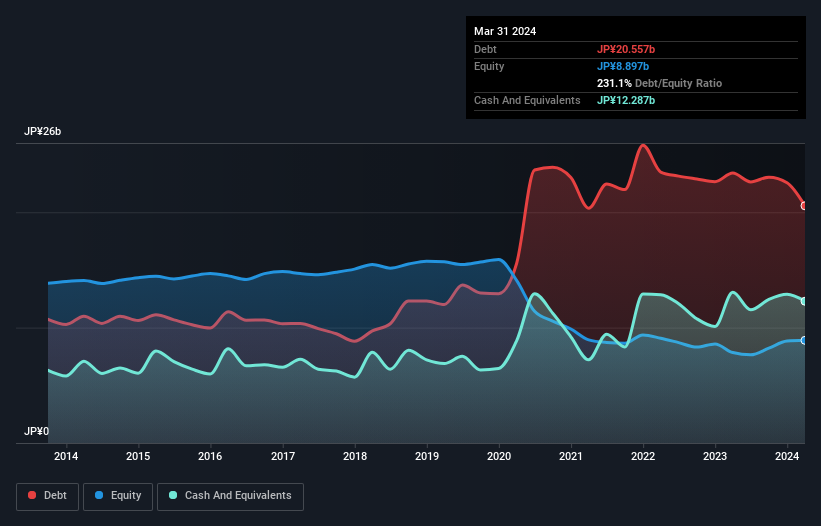
The external fund manager backed by Berkshire Hathaway's Charlie Munger, Li Lu, makes no bones about it when he says 'The biggest investment risk is not the volatility of prices, but whether you will suffer a permanent loss of capital.' It's only natural to consider a company's balance sheet when you examine how risky it is, since debt is often involved when a business collapses. We can see that Gourmet Kineya Co.,Ltd. (TSE:9850) does use debt in its business. But the more important question is: how much risk is that debt creating?
When Is Debt Dangerous?
Debt is a tool to help businesses grow, but if a business is incapable of paying off its lenders, then it exists at their mercy. Ultimately, if the company can't fulfill its legal obligations to repay debt, shareholders could walk away with nothing. However, a more frequent (but still costly) occurrence is where a company must issue shares at bargain-basement prices, permanently diluting shareholders, just to shore up its balance sheet. Of course, the upside of debt is that it often represents cheap capital, especially when it replaces dilution in a company with the ability to reinvest at high rates of return. The first step when considering a company's debt levels is to consider its cash and debt together.
View our latest analysis for Gourmet KineyaLtd
How Much Debt Does Gourmet KineyaLtd Carry?
As you can see below, Gourmet KineyaLtd had JP¥20.6b of debt at March 2024, down from JP¥23.4b a year prior. However, because it has a cash reserve of JP¥12.3b, its net debt is less, at about JP¥8.27b.

How Strong Is Gourmet KineyaLtd's Balance Sheet?
According to the last reported balance sheet, Gourmet KineyaLtd had liabilities of JP¥8.22b due within 12 months, and liabilities of JP¥20.6b due beyond 12 months. Offsetting these obligations, it had cash of JP¥12.3b as well as receivables valued at JP¥2.51b due within 12 months. So its liabilities outweigh the sum of its cash and (near-term) receivables by JP¥14.0b.
This is a mountain of leverage relative to its market capitalization of JP¥23.1b. Should its lenders demand that it shore up the balance sheet, shareholders would likely face severe dilution.
We measure a company's debt load relative to its earnings power by looking at its net debt divided by its earnings before interest, tax, depreciation, and amortization (EBITDA) and by calculating how easily its earnings before interest and tax (EBIT) cover its interest expense (interest cover). This way, we consider both the absolute quantum of the debt, as well as the interest rates paid on it.
Gourmet KineyaLtd's debt is 5.0 times its EBITDA, and its EBIT cover its interest expense 3.4 times over. This suggests that while the debt levels are significant, we'd stop short of calling them problematic. However, the silver lining was that Gourmet KineyaLtd achieved a positive EBIT of JP¥422m in the last twelve months, an improvement on the prior year's loss. When analysing debt levels, the balance sheet is the obvious place to start. But it is Gourmet KineyaLtd's earnings that will influence how the balance sheet holds up in the future. So if you're keen to discover more about its earnings, it might be worth checking out this graph of its long term earnings trend.
Finally, a company can only pay off debt with cold hard cash, not accounting profits. So it is important to check how much of its earnings before interest and tax (EBIT) converts to actual free cash flow. In the last year, Gourmet KineyaLtd's free cash flow amounted to 33% of its EBIT, less than we'd expect. That weak cash conversion makes it more difficult to handle indebtedness.
Our View
Mulling over Gourmet KineyaLtd's attempt at managing its debt, based on its EBITDA,, we're certainly not enthusiastic. Having said that, its ability to grow its EBIT isn't such a worry. Looking at the balance sheet and taking into account all these factors, we do believe that debt is making Gourmet KineyaLtd stock a bit risky. That's not necessarily a bad thing, but we'd generally feel more comfortable with less leverage. The balance sheet is clearly the area to focus on when you are analysing debt. However, not all investment risk resides within the balance sheet - far from it. For example Gourmet KineyaLtd has 2 warning signs (and 1 which can't be ignored) we think you should know about.
Of course, if you're the type of investor who prefers buying stocks without the burden of debt, then don't hesitate to discover our exclusive list of net cash growth stocks, today.
New: Manage All Your Stock Portfolios in One Place
We've created the ultimate portfolio companion for stock investors, and it's free.
• Connect an unlimited number of Portfolios and see your total in one currency
• Be alerted to new Warning Signs or Risks via email or mobile
• Track the Fair Value of your stocks
Have feedback on this article? Concerned about the content? Get in touch with us directly. Alternatively, email editorial-team (at) simplywallst.com.
This article by Simply Wall St is general in nature. We provide commentary based on historical data and analyst forecasts only using an unbiased methodology and our articles are not intended to be financial advice. It does not constitute a recommendation to buy or sell any stock, and does not take account of your objectives, or your financial situation. We aim to bring you long-term focused analysis driven by fundamental data. Note that our analysis may not factor in the latest price-sensitive company announcements or qualitative material. Simply Wall St has no position in any stocks mentioned.
Have feedback on this article? Concerned about the content? Get in touch with us directly. Alternatively, email editorial-team@simplywallst.com
About TSE:9850
Proven track record with imperfect balance sheet.
Market Insights
Community Narratives



